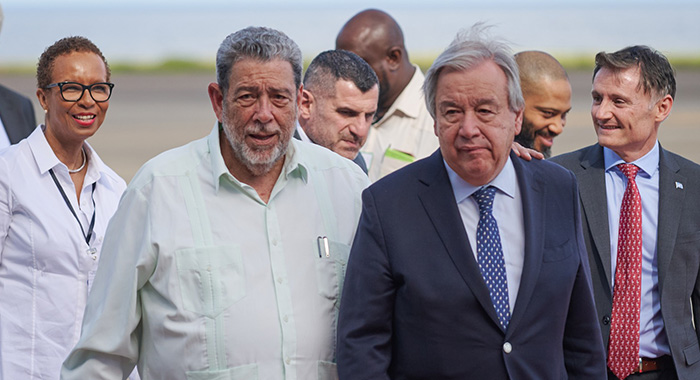KINGSTOWN, St. Vincent (CMC) — United Nations Secretary General, Antonio Guterres, says three things are needed in Haiti including an “effective, political progress for a political solution.
“We need a security system that allows to end domination of the gangs and the criminality that is destroying the country. And I hope that an international force for which I fought will be able to soon be in Haiti, but we also need much more international support from the humanitarian and economic point of view,” said Guterres, who is here to attend the eighth summit of the Community of Latin American and Caribbean States (CELAC) here later today (Friday).
In January, the Kenya High Court ruled against sending troops to Haiti as part of the Multinational Security Mission (MSS) to restore peace and security in Haiti.
Last October, the UN Security Council authorised the deployment of the MSS to back Haiti’s beleaguered police force, which Kenya offered to lead. A 2022 sanctions regime, targeting gang leaders and their financiers, was also renewed.
CARICOM leaders at their summit in Guyana that ended on Wednesday, issued a statement recognising the leadership of Prime Minister Ariel Henry, who came to power following the assassination of President Jovenel Moise in July 2021, and who has “committed to major steps to move the political process forward, including the holding of general elections to restore constitutional government and authority no later than Aug. 31, 2025”.
In addition, the regional leaders said that an electoral needs gap assessment team will be put together led by CARICOM and the United Nations with the support of Canada, United States and the Organization of American States (OAS) by March 31 to support planning and efforts of the relevant institutions to be established in Haiti.
Last July, Guterres told CARICOM leaders that to address the problem in Haiti an estimated budget of US$720 million would be needed, but so far only 23% of that financing has been collected.
Asked by reporters how much of that financing has been collected and how much is needed to bring peace to Haiti, the UN Secretary General acknowledged that the humanitarian appeal of last year was insufficiently funded.
“We just launched a new humanitarian appeal and I hope that this time the world will understand that the people of Haiti are suffering so much that at least in the minimum of the minimum that corresponds to the basic needs — there is an effective response of the international community.
“That is my strong appeal. But that will not replace the need for a political solution and the need for establishment of security,” he added.
Asked about the CARICOM statement that the 15-member regional bloc is hoping for elections in the French-speaking CARICOM country by August next year, Guterres noted that “in relation to Haiti, there was some progress with the constitution of the presidential council, with the checks and balances that were established and with the scheduling of the elections.
“The problem that we need to be absolutely sure is solved is implementation. And that things are not postponed or that things, or that nobody is dragging his or her feet.
“So, we absolutely need now to move quickly in the implementation of what was decided because let’s be clear, you can put as many police forces as possible in Haiti [but] if there is no political solution, the problem will not be solved,” he added.
St. Vincent and the Grenadines Prime Minister, Ralph Gonsalves, who attended the CARICOM summit, said it is important to put the Haiti situation into context.
“I don’t want anyone to go away with the impression that Prime Minister Henry and CARICOM have set the solution for the Haitian problem, because to say that would be entirely wrong,” he said.
Gonsalves said that it has to be acknowledged that Henry has moved towards “a position of compromise.
“There was in my view, hitherto greater intransigence. We have seen much movement and we are seeing a political compromise on the horizon within the broad terms of the statement made by CARICOM.
“Clearly, not everything which was discussed would be in a statement for the simple reason CARICOM as a partner is looking for a solution, and CARICOM is specifically mentioned in the United Nations Security Council resolution on Haiti.
“What CARICOM did was within the four walls of the Security Council resolution on Haiti, the broad parameters were sketched by His Excellency the Secretary General,” he added.
But Gonsalves maintained that “CARICOM cannot come to a conclusion on Haiti with Prime Minister Henry.
“This solution as the resolution states, the UN Security Council Resolution, this has to be a Haitian-fashioned, a Haitian-led, and a Haitian-executed agreement.
“We await responses to this movement, to this initiative by CARICOM and the Haitian Prime Minister, to see what the other Haitian stakeholders would say. And they themselves may wish to consider, having stared into the abyss, whether they ought not, in all the circumstances reasonably, to move from hitherto fixed positions, to some compromise in moving forward for the good, and the betterment of the Haitian people,” Gonsalves told reporters.






